
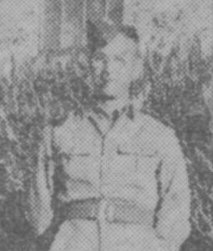
Chapters
Click on any link shown in Blue and then use the Back Button to return to this Page
Sungei Geron 1944 to 1945
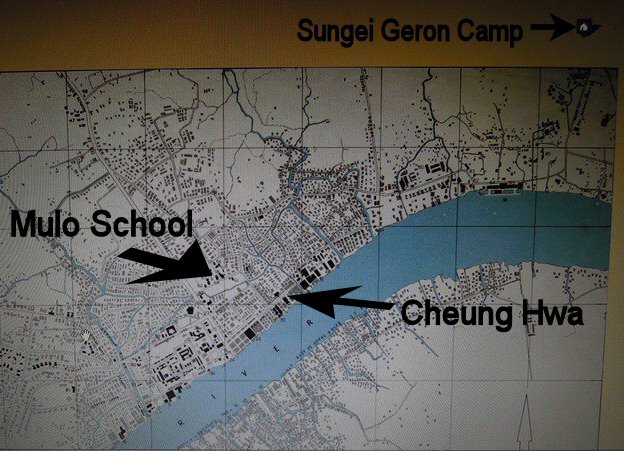
The Location of Sungei Geron camp relative to the other POW camps
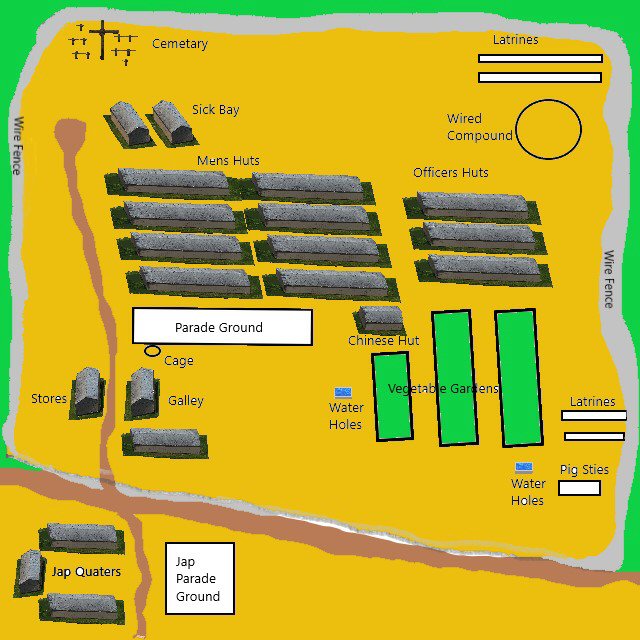
Sungei Geron camp (Based on Ray Stubs drawing in his "Prisoner of Nippon" book)
1944 saw the POWs merged into one large workforce and were taken each day to a large site about tree miles outside of the town of Palembang . They were employed clearing and leveling the ground , which was semi jungle. It was hard work removing the Bamboo trees and roots and moving tons of earth to level off the whole site. Once the site had been cleared , building material arrived , long bamboo poles and Attap leaves and rolls of barbed wire fence . It was clear that the Japanese were making the POWs build their own Prisoner of War
The Reason the Japanese did this was to make the camp more secure and to prevent the POWs having any contact with the Native Sumatrans , as by now the Japanese realized that the tide of the war was now against them . There was a general hardening of the Japanese attitude towards the POWs .
The POWs Built long huts out of the bamboo poles in the form of a lattice work (see photo) and the Attap (Dried Palm Leaves) was stitched to the bamboo using Rattan (a type of jungle creeper) . After a few week work the camp was finished and the POWs were given an 'Iasme' day (rest day) to get their possessions ready for moving .They were transported by lorries each carrying their pathetic little possessions wondering what the future held. The new camp was used to house all the POWs from Both Mulo School and Cheung Hwa
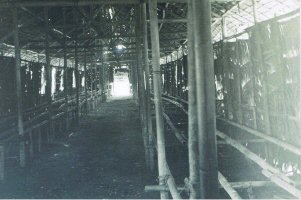
Interior of of the huts
Each morning the POWs had 'tenko' on the parade ground and working parties were detailed for their allotted tasks outside the new camp the same as previously at Cheung Hwa and Mulo school , but the distance to travel was futher.
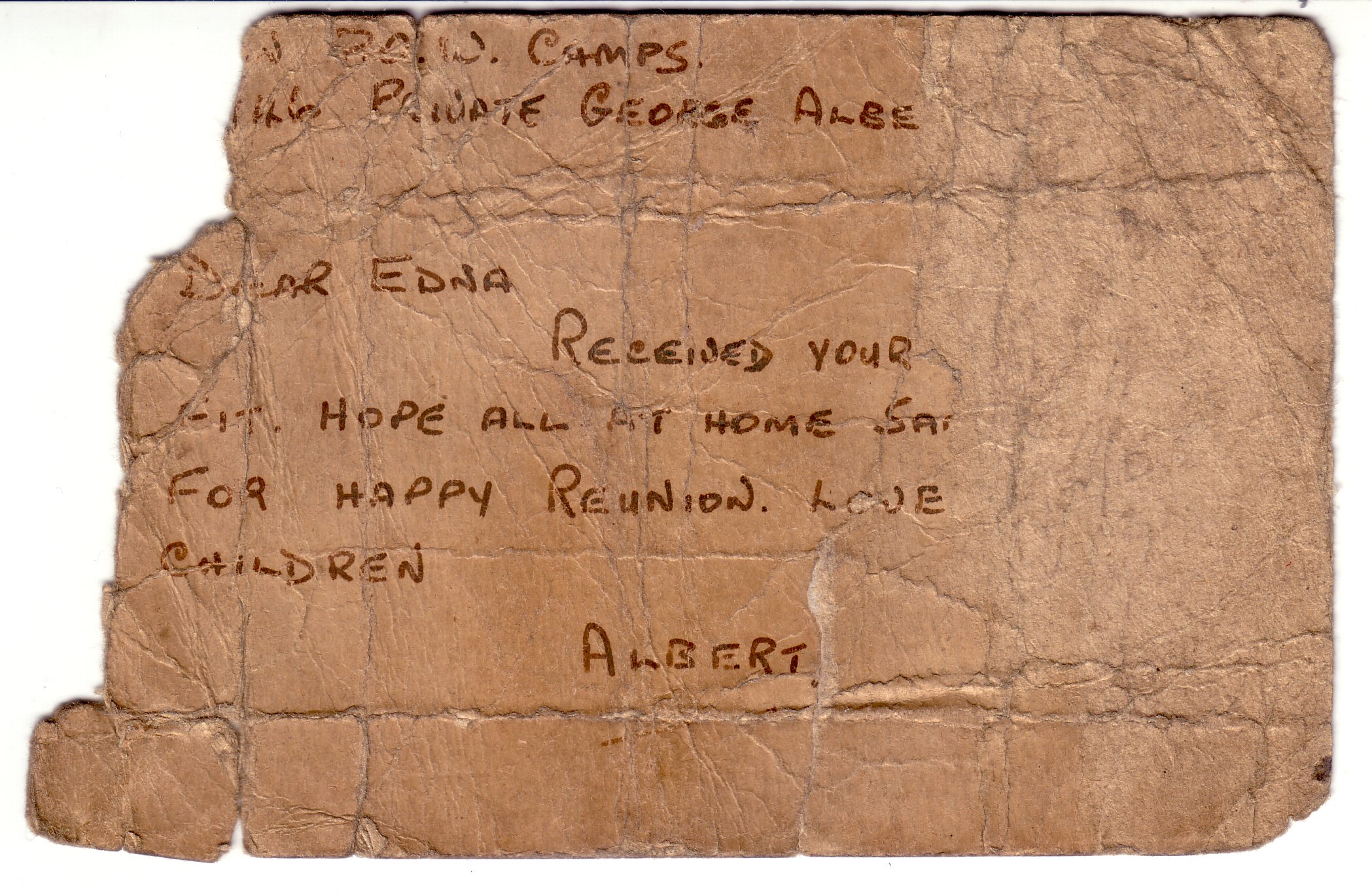
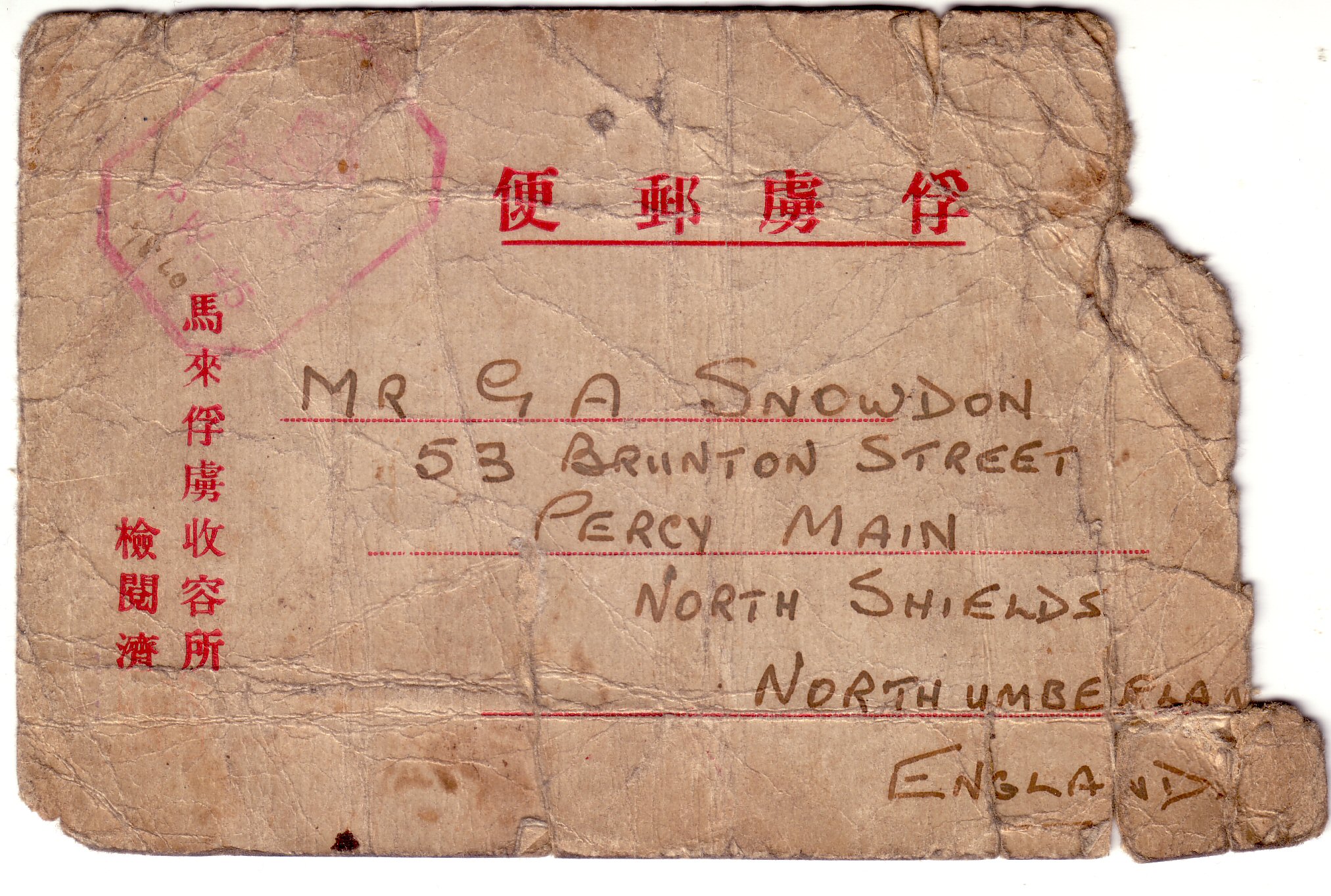
Dads Japanese Post Card sent from the POW camp
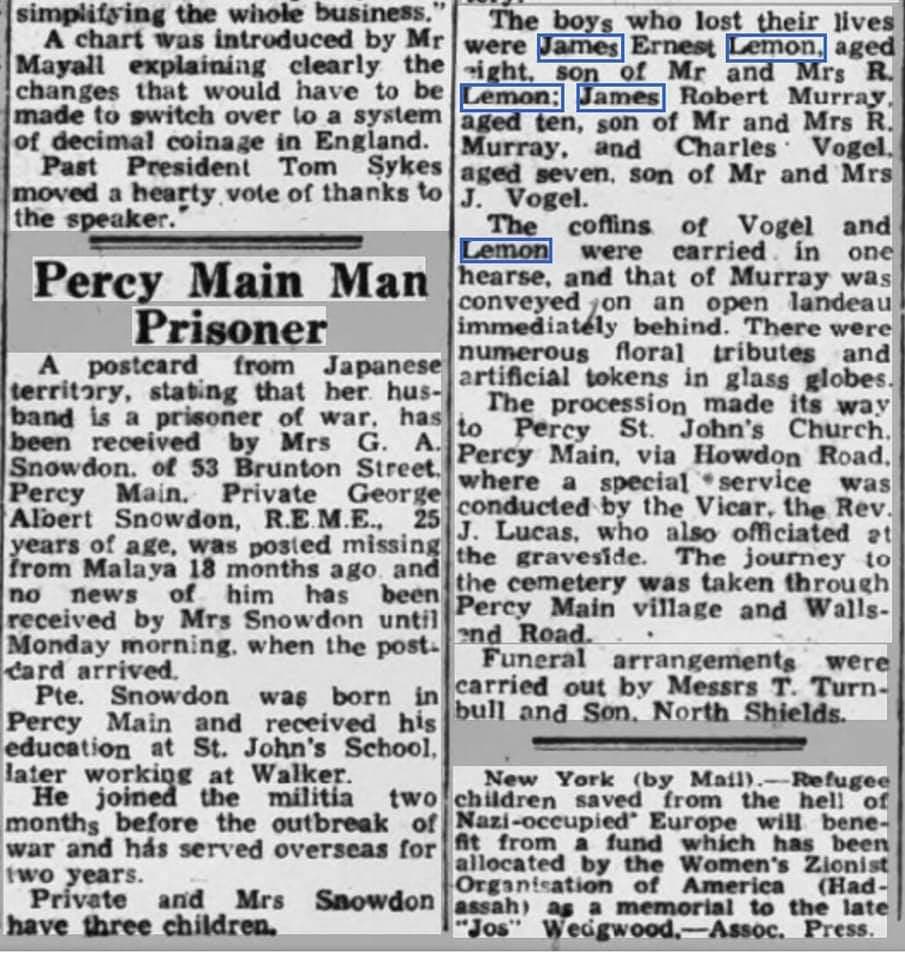
Article that was written about my Mother reciving the post card from my Dad
During the Latter part of 1944 the conditions in the camp had deteriorated to such an extent that every POW was suffering from serious loss of weight due to the starvation diet the POWs were now on and the increasingly less chance to barter with the natives . The POW were by now showing the effects of lack of essential vitamins and protein . More and more POWs were succumbing to illness as there bodies immune system was unable to cope . The Doctors , Reed and Corcoran and their sick-bay attendants (my Father worked as an orderly in the Hospital) struggled against the odds to care for the sick . It became clear after the Japanese surrender that vital medical supplies were withheld by the Japanese .
As it was the Doctors had to make do with whatever was available , Bandages and Dressing were salvaged from bits of rags or scraps of old clothing and sometimes boiled rice sacks . There were no beds in the 'Hospital' , just bamboo shelves or stretchers improvised from rice sacks and bamboo poles . There were few antiseptics , no medical instruments and no sterilizing facilities. The containers were mostly made out of bamboo . Despite these limitations some of the miraculous medical treatment was carried out by the Doctors . The POWs were by now so undernourished that catching any illness could result in serious conditions and even death , Tropical ulcers were a horrific prospect for any POW that happened to get even just a minor scrape , this could lead to microorganisms that would eat the flesh to the bone . The treatment of tropical ulcers by the Doctors with their rudimentary implements and lack of drugs was agonizing , the puss would have to be scrapped out using a spoon without any anesthetic. Once the would was free of puss the fleshy hole would be filled with any substance that had antiseptic properties , A type of cloths die specially stolen was used , but in the absence of this , salt would have been used , the pain must have been terrible .
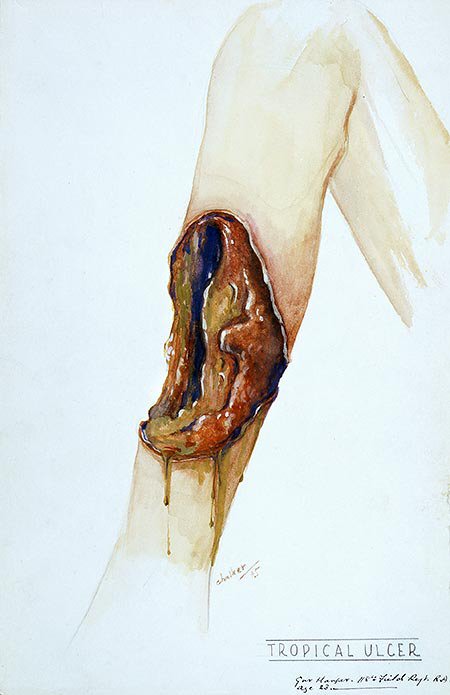
Tropical Ulcer
Sometimes amputation was the only way to save the POWs life , again this would have been performed without anesthetic. Tropical ulcer although a horrific decease , Dysentery and Diarrhea caused the most deaths as the continuous passing of waste caused dehydration and drained the POWs of vital vitamins essential for their survival .
The lack of a varied diet made 'Avitaminosis' (diseases caused by vitamin deficiency) widespread . The most common illnesses were 'Beriberi' and 'Pellagra' caused by lack of vitamin B1 and Niacin which was absent from white rice , the main food supplied by the Japanese .
'Pellagra' , which caused skin lesions and Diarrhoea , was known as 'the four Ds' , Dermatitis , Diarrhoea , Dementia and Death . The systems of Beriberi were wasting and partial paralysis , The POWs noticed that their ankles began to swell , followed by loss of muscle function , vomiting and mental confusion .
One particular nasty decease was Strongyloides , a parasitic worm infection that could last upto 30 years in the person infected. It normaly was contracted during contact with contaminated soil were the strogyloides lavae penatrated the skin.
Strongyloides
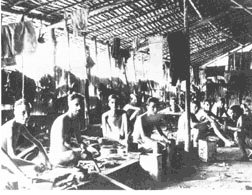
Inside a POWs hut
By 1945 the food rations were dwindling as a result of the war going against the Japanese and any food or other supplies for that matter , that got through to the camp were taken by the Japanese and only a small proportion were given to the POWs . Raids by the POWs on the Guards waste bins , were things like banana skins or tropical root peeling were collected and then boiled up into a revolting mess , but still hungrily consumed by the starving POWs. Any cat or dog that strayed into the camp was immediately pounced on and dispatched . The Japanese for reasons known only to them banned all POWs from making a fire except for the Cook house and the man employed in empting the cesspit , who was allowed to heat water up after his days work to have a bath . So now even if the POW could steal or find any other type of food to supplement their daily ration of rice , by now down to about a third of a cup full , they were unable to cook it .
As can be imagined that things were getting pretty desperate and the moral of the POWs was getting very low , then at the end of January 1945 some Royal Navy Planes flew over Sungei Geron , but thinking it was a Japanese army camp proceeded to bomb it , all hell broke lose , the Japanese began running around in confusion their NCOs barked orders and the POWs stood and cheered , at last the first contact with the world outside and confirmation of the rumors of the war now , finally turning against the Japanese . The result of the Bombing rain was that a Japanese guard had been hit by shrapnel from one of the Bombs , which caused another cheer from the POWs , but the Japanese soon restored order and forced the POWs back into their huts for the rest of the day , without any food.
The Air raids that took place were , as it turned out were aimed at the Oil Refineries and the planes were flown from the Aircraft Carries 'Victorious' , 'Illustrious' , 'Indomitable' and 'Indefatigable'
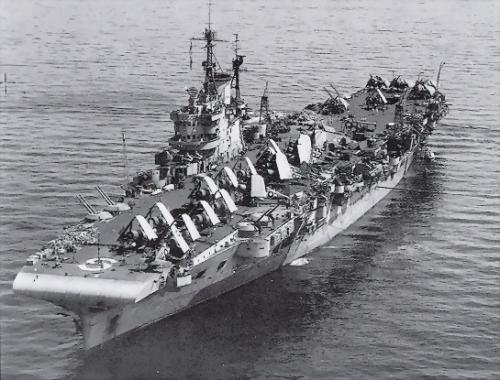
HMS Victorious built at Vickers Armstrong Newcastle upon Tyne
Fairy Swordfish planes from this Aircraft Carrier were involved in the Sinking of the Bismarck also
After the Air raids the camp resumed its normal routine , After 'Tenko' some of the prisoners would be organized into work parties and taken out of the camp to their relevant places of employment , and the prisoners resumed their practice of trying to steal or barter anything remotely edible to take back to camp , the punishment for stealing became more and more severe until finally the Japanese erected some very small barbed wire cadges approximately six feet square (2 meters x 2 meters) into which POWs found stealing were imprisoned with only use of essential eating utillities , the cadge was so small the POW could not lie down properly and obviously could not lean against the barbed wire wall and were left to burn in the day sun and freeze in the cold nights , they also had their food rations cut . The POWs would try and smuggle some extra food to the cadged POWs but it was taking a tremendous risk , until the POWs came up with a better plan . The food was smuggled into the Latrines and left there for the convicted prisoners to get when they were allowed to go to the Latrines .
This hiding place was the perfect place to hide the food because the Guards would never enter the Latrines as they were the most disgusting places , as it has been stated , the POWs were suffering from Dysentery or Diarrhea and the Latrines were no more than an open trench with planks over them for the POWs to squat on and simple 'attap ' walls and roof and they quickly filled up and were infested with blow fly's and maggots and the stench would have been horrendous.
Rumors began to spread that Germany had surrendered ( 7th May 1945) , the rumors were put about as being recived from information given by the Native but after the war it turned out that the Officers actually had a radio that had bee kept secret throughout the years of captivity , this had to be kept secret because if the Japaneses had discovered it the owner would most certainly be executed .
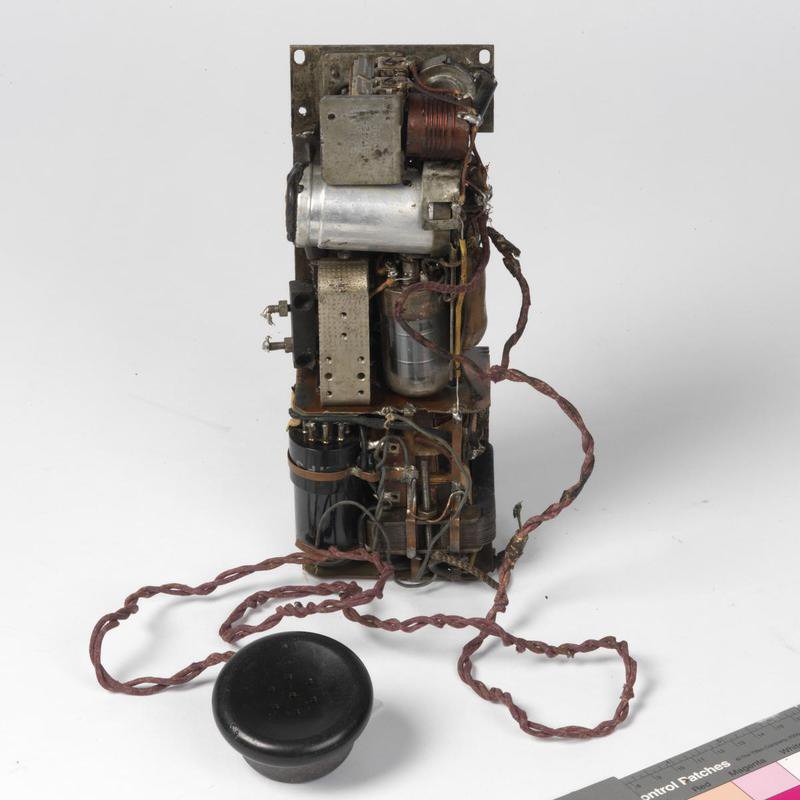
Typical type of radio hidden in the POW camps
The surrender of Germany was confirmed at an evening 'Tenko' were the commander of the guards told the POWs that even though Germany had surrendered the Japanese were determined to fight on . An other announcement was made that all senior Officers and some of the POWs were to be transferred to Singapore , this took place on the 31st of May 1945 when the ex KPM ship "SIBOLGA" of about 1300 Tons sailed to Singapore with approximately 1400 POW .
The new commander was going to be Captain W.C. S. Corry of the Federation Malay Volunteer Reserve . Rations were again reduced and the workloads increased . The POW death rates began to climb rapidly , the POWs tried to give each prisoner that died a decent burial , the dead were wrapped in a rice sack and placed into a bamboo coffin built so that only the base stayed in the grave and the top and sides were lifted out and reused for the next funeral , but the numbers of dying began to increase and the Japanese decided that all bodies had to be buried in a communal grave wrapped simply in a rice sack . It was clear to most POW that unless the war ended soon most of them would never see their homes again. The POWs had that on a given single , the POWs were to be herded into specially built stockade and massacred.
On the 6 August 1945 a B29 Superfortress , 'Enola Gay' named after the mother of the pilot Colonel Paul Tibbets dropped the first Atomic Bomb on Hiroshima followed on the 9th August by a second Atomic Bomb being dropped on Nagasaki .
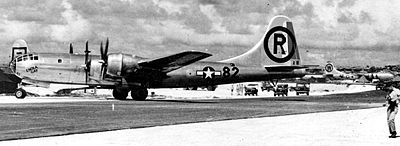
B29 Superfortress 'Enola Gay'

"Little Boy" The Atomic Bomb dropped on Hiroshima
For the prisoners unaware of theses events happening far away in Japan life in the camp continued , but a few days later things started to happen in the camp , The rice ration was quadrupled almost over night and unheard of luxuries were issued , Mosquito nets toothbrushes and boots were handed over to the POWs . Even the cigarettes from the Red Cross Parcels that had arrived many months before were handed out . It became quite clear the war was over , Japan unconditionally surrendered on the 15th August 1945 . There was no official announcement but the behavior of the guards changed dramatically and all working parties were suspended , but the POWs were still left wondering what was going to happen to them and this lasted up to the last few days of August . Eventually a joint statement from the Camp commandant and the Senior British Officer confirmed that the war was over. Even though the war was over the Senior British Officer stressed that the Japanese and Korean guards were going to be in control of the camp 'For the POWs protection' and there were to be no reprisals against the guards as the nearest allied troops were in Singapore . The POWs were given Air Mail notepaper and instructed to write home , and it became a strange sort of existance were the POWs could move around freely and even leave the camp and visit the local villages , but the spectre of the privations of the last three years were still taking its toll .
Eric Diss who's Diary was one of the most important document I found during my research on my Father ,
Died on the 20th August 1945 , five days after the Japanese surrender and only three days before the Australian Air Force flew supplies in.
For the Japanese the realization that they had not only been defeated , but they surrendered unconditionally , something they always used as an excuse to abuse the POWs with . Some of the Japanese committed 'Hari Kari'
but most of them and also the Korean guards tried to get on the good side of the POWs by asserting that they were only following orders , the POWs reacted by turning around and ignoring them completely , this is not to say that some POWs took the law into their own hands , they were reprimanded for putting the whole camp in jeopardy but every POW understood how they felt. In the days that followed the Wireless operators managed to get a message to New Deli in India , and informed the authorities of the camps location . The POWs were informed to clear a large space in the camp and to mark out a large P.W sign on the ground . The next morning a small spotter plane flew overhead and dropped a small package in to the camp , the package consisted of a jar of brylcreem . The next day bigger planes flew over the camp and dropped supplies but one one an attempted try at a second run banked too steeply and crashed into the ground . The POWs raced to the crash scene but the airplane erupted into a ball of flame , all the crew sadly perished , a terrible tragedy , to lose their life while trying to bring relief to the POWs . The supplies dropped were evenly distrubuted to each POW but since the POWs had eating mostly Rice , the new food stuffs were a complete shock to the system and almost all of the POWs suffered stomach or Bowel malfunctions and it was going to take many weeks before the POWs could readjust to European food again.
News that the camp was to be visited by Lady Edwina Mountbatten , her Husband Lord Louis Mountbatten was Supreme Commander South East Asia . The ex-POWs busied themself tidying up the camp and themselves . On the day of her visit she toured the camp and talked to a few of the ex-POWs her shock at what she saw is evident in her entry in her Diary "No Praise can be too high for what the Doctors , and Surgeons and R.A.M.C , orderlies have done in the Camps , even though they had no medical supplies , drugs or equipment. The way they improvised was quite staggering"
She continues :-
"I spent nearly a week in Sumatra , the Japanese did what we told them and we eventually succeeded in the evacuation of British , Australian and India prisoners by boat and also by Dakota aircraft flown from hastily improvised airstrips , on the whole the evacuation went extraordinarily well considering the vast area covered , in Sumatra we evacuated all the Prisoners of war without a single allied soldier landed or the Navy lying of shore , luckily it worked and there is no doubt that had the war gone on just a few more weeks there would not have been any Prisoners of war left alive , they were absolutely on their last gasp and the tragedy is that so many did die in the last few weeks before surrender and even after it."
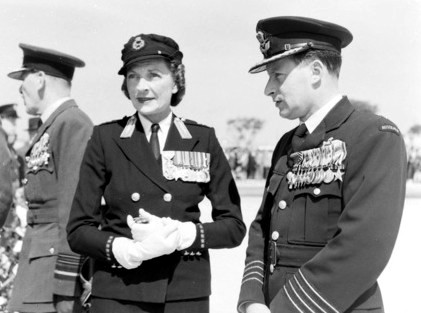
Before she left Lady Mountbatten address the ex POWs and promised to do everything in her power to have the ex POWs flown out of Sumatra.
I have no doubt whatsoever that without the Dropping of the Atomic Bombs , terrible as they were , forcing the surrender of the Japanese , my father and many other prisoners would never have returned home . We owe a great debt of gratude to the American armed forces for their own sacrifices without which the victory over Japan would never have happend.
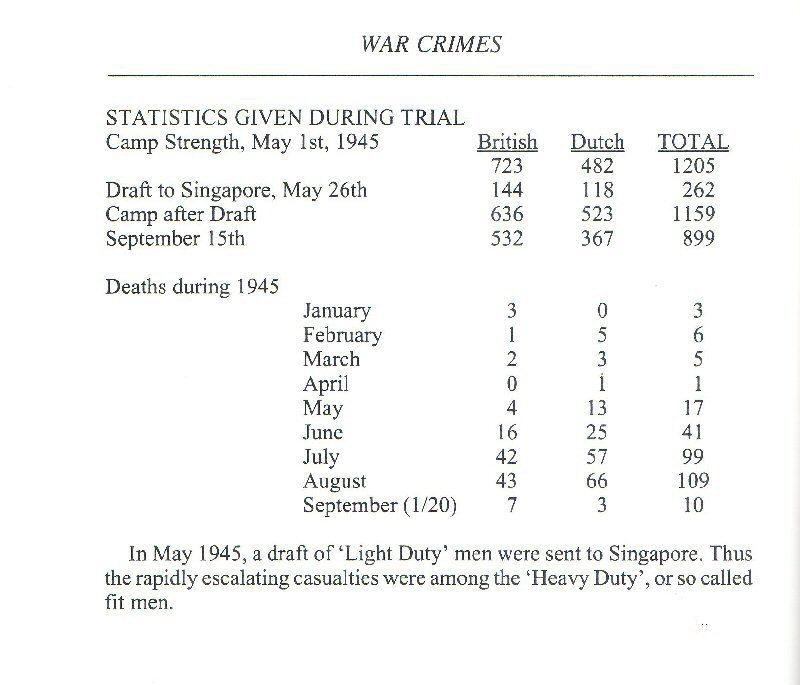
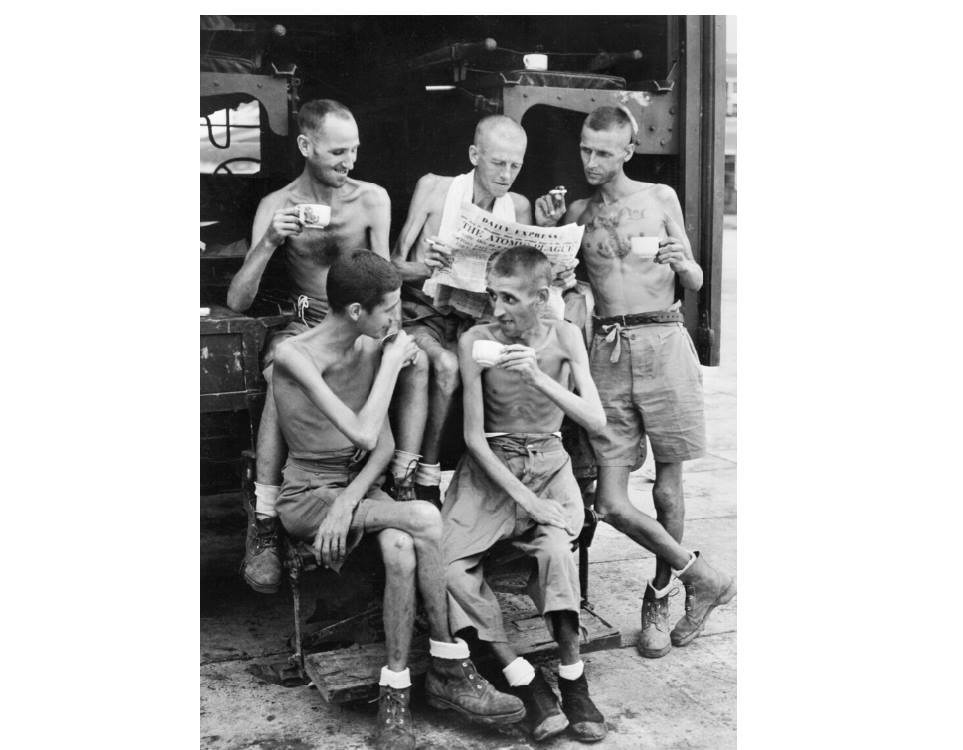
Pictures of some men who had been released from Sungie Geron , one of them Tom Wardrope , standing to the right with a cup of tea , was in the Argyll and Sutherland Highlanders and wrote a book about his war experience titled "Sayonara , Mine Enemy" .
The first ex POWs to be evacuated were the stretcher cases and then the walking sick the day after , all flown out by Dakota Aircraft to Singapore.
Lverpool School of Tropical Medicine Captive memories
A Record was secretaly kept or all POW in the Sungei Geron
My Father is listed below .
Report by Wing Commander W R Wills-Sandford about the treatment of Officers and other Ranks of the RAF
https://www.cofepow.org.uk/armed-forces-stories-list/japanese-treatment-of-raf
NEXT CHAPTER: BACK TO TOP